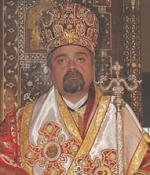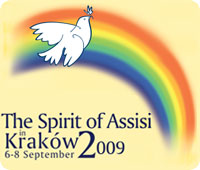
Metropolita ortodoxo, Patriarcado ecuménico
|
Meditation on John 14, 27
Dear brothers and sisters,
Through His Holy Disciples, the Lord Jesus gives us his peace. The moment in which he performs this significant act is not chosen by chance. It is shortly before His redeeming Passion, the same moment as when he spoke about unity “so that the world may believe it was You who sent me”. (John 17,21)
But Jesus does not give us plain peace, a generic or abstract form of peace, he gives us concrete peace. In this he is categorical and very clear. He gives us His peace, which is different from that of the world, because it leads to tranquillity, quiet, to an inner state of calm for the body and the soul, which dispels all turmoil and fear from the human heart.
The word “peace” is frequently present in the Lord’s speeches. We could even say that this vital subject is much loved by Him, because it seems he is talking about himself, He who is peace, peace par excellence.
Peace is a precious good we all sing of and invoke, but only a few people look after it so that it may bear fruit and rule the world. Often, instead of peace, people serve conflict, contraposition, and war between nations, within societies, families, and in men and women who experience division and turmoil. This martyred land knows all too well what war means, because it experienced its horror exactly 70 years ago.
Before leaving us peace, His peace, Jesus spoke about “love” (Jn 14:23-24) and the “Holy Spirit” (Jn 14:26). In this way He indissolubly links peace and the Holy Spirit. True peace requires selfless love and both, love and peace, are fruit of the Holy Spirit, as the Apostle of the Nations, St Paul, affirms in his Letter to the Galatians (5:22-23).
In a world that has driven Christ out of its life, which has chosen as its way of living the dividing power of sin, which has denied the holy peace of God-Man, it is only natural that tragic events and phenomena occur that debase the human personality and crush the value of man. Today’s world is “inside evil” and it forgets that the Lord called the builders of peace blessed and “children of God”, providing also a means of justification and personal salvation to whoever chooses God’s peace in his life and transmits it to others.
Today’s lack of peace is chiefly due to three main factors.
The first cause is the fact that our secularized society has turned away from God’s will. Man is not able to be at peace when he is far from Christ, because “He is our peace”, the source of peace. We mentioned the words of Paul, that peace is the fruit of the Holy Spirit. But if it is to bear fruit the Spirit of God needs to rule the world, for it is the Spirit of peace par excellence. The world needs to recognize the true God, return into His arms and acquire its lost virtue.
The second factor is peaceful coexistence and relationships with our neighbours. This requires “that every man should be aware of his shortcomings”, as St Silouan the Athonite wisely underlined, leaving selfishness behind, as well as the regular tendency of human beings to command, govern and rule over others. Fortunately there are no world wars in our days, but peace is constantly wounded, continuously bleeding, like the woman in the passage from the Gospel (Luke 8:41-56), but she was healed by the King of Peace, who finally said: “go in peace”. The frenzy of contemporary men and women to dominate and predominate, using any means, legitimate and illegitimate, has as its immediate consequence the injustice and inequality we all observe.
The third motive is personal peace. It is not something that happens outside, it is especially an internal matter of the heart. In order to attain it, it is necessary to withdraw from hatred and anger, unjust criticism and the temptation to sin, and overcome passions by prayer, repentance and ascesis.
With the blood of His sacrifice on the Cross, Jesus has pacified what was under the regime of division and corruption: the human race. Peace according to the Holy Fathers of the Church has two characteristics: it is spiritual as well as material, because if there is no peace in the body, there can be no peace in the soul and in the universe. Physical peace leads to humility, calm, quiet, prayer and spiritual life, while peace of the soul leads to purification, enlightenment, holiness and perfection in Christ. And the mystical divine-human Body of the Church is the place par excellence where peace of the body and peace of the soul can be attained, the inner peace of Christ. From there this peace can spread like light to the world. The Holy Fathers bearers of God define it “peace beyond all minds” (e????? ? pa?ta ?pe?????sa) and guidance to holiness, because, as St Nectarius of Egina said, “peace is the light that dispels the darkness of sin”, and finally St Paul, who wrote words similar to those the Lord had said in his Sermon on the Mountain (the Beatitudes) “without peace and holiness no one will see the Lord” (Heb 12:14).
The peace of Christ must accompany our life and works, it must affect our personal status and our relationship with God and our neighbours, because being at peace with the Triune God, the Giver of true peace, and with one’s neighbour, peace will shine also in the world that surrounds us.
This is the purpose that drove and still drives the Community of Sant’Egidio, which is so dear to me since my long priestly service in beloved Italy. The Community has understood the power and opportunities of Churches and Religions, and especially of prayer and dialogue, which extinguish conflicts. May peace rule over the world, peace inspired by the “Spirit of Assisi”, as it was envisioned by the blessed servant of God and unforgettable Pope John Paul II, a son of this martyred land and faithful Shepherd for many years of the Church of God in Cracow, who is spiritually present in this holy moment, rejoicing in heaven and sending us His holy and encouraging blessings, still working for the peace of Christ to be achieved in the turmoil of our secularised and materialistic world.
The presence of the Ecumenical Patriarchate of Constantinople, which I have had the great honour and privilege to represent, bringing you the fraternal greetings of His Holiness Ecumenical Patriarch Bartholomew I, sincere friend of the Community and supporter of its sacred vision, and of the other local autocephalous Orthodox Churches, at the Peace Meetings of the Community of Sant’Egidio shows our common commitment for peace, true peace, that it may remain forever among humankind and never leave us.
By the intercession of the Holy Mother of God and Virgin Mary, Queen of Peace, whose Birth we celebrate today, of St Egidio, St Francis of Assisi and of the servant of God John Paul II, let us open the gates of the King of truth, Jesus Christ, our common Lord and Saviour. Amen!
|

